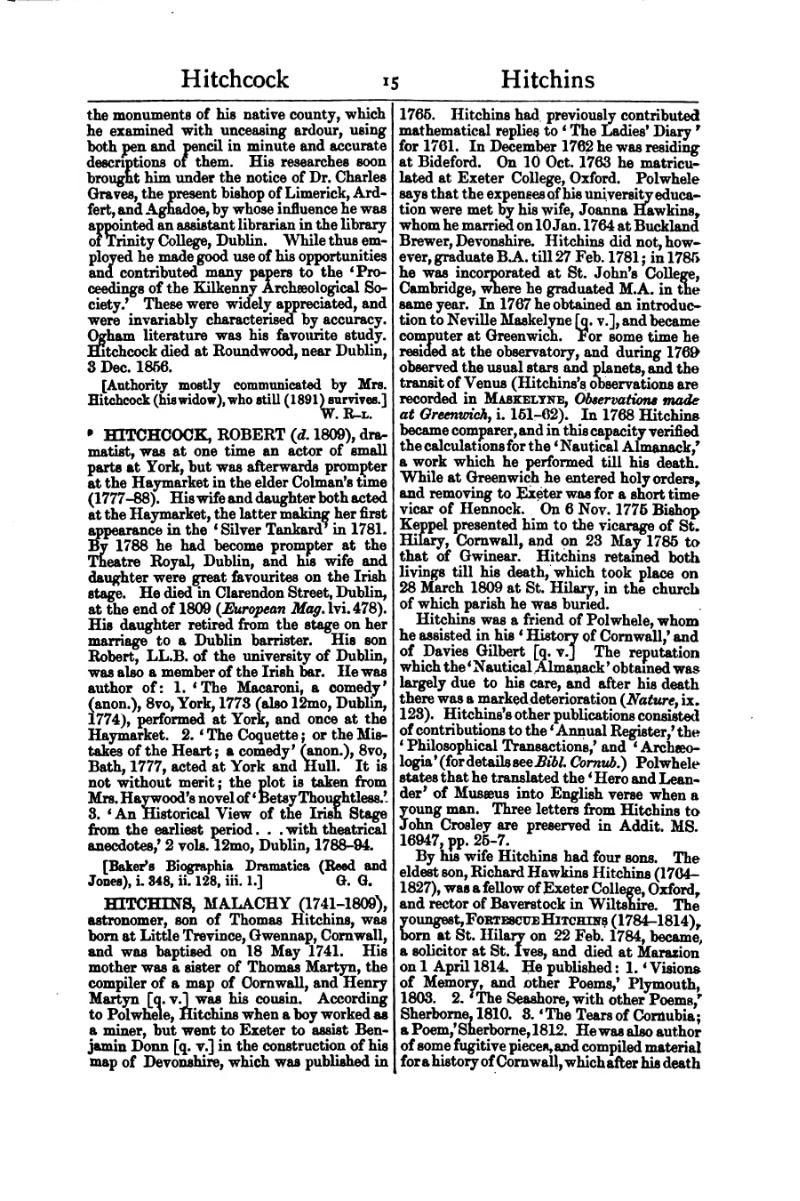the monuments of his native county, which he examined with unceasing ardour, using both pen and pencil in minute and accurate descriptions of them. His researches soon brought him under the notice of Dr. Charles Graves, the present bishop of Limerick, Ardfert, and Aghadoe, by whose influence he was appointed an assistant librarian in the library of Trinity College, Dublin. While thus employed he made good use of his opportunities and contributed many papers to the ‘Proceedings of the Kilkenny Archæological Society.’ These were widely appreciated, and were invariably characterised by accuracy. Ogham literature was his favourite study. Hitchcock died at Roundwood, near Dublin, 3 Dec. 1856.
[Authority mostly communicated by Mrs. Hitchcock (his widow), who still (1891) survives.]
HITCHCOCK, ROBERT (d. 1809), dramatist, was at one time an actor of small parts at York, but was afterwards prompter at the Haymarket in the elder Colman's time (1777–88). His wife and daughter both acted at the Haymarket, the latter making her first appearance in the ‘Silver Tankard’ in 1781. By 1788 he had become prompter at the Theatre Royal, Dublin, and his wife and daughter were great favourites on the Irish stage. He died in Clarendon Street, Dublin, at the end of 1809 (European Mag. lvi. 478). His daughter retired from the stage on her marriage to a Dublin barrister. His son Robert, LL.B. of the university of Dublin, was also a member of the Irish bar. He was author of:
- ‘The Macaroni, a comedy’ (anon.), 8vo, York, 1773 (also 12mo, Dublin, 1774), performed at York, and once at the Haymarket.
- ‘The Coquette; or the Mistakes of the Heart; a comedy’ (anon.), 8vo, Bath, 1777, acted at York and Hull. It is not without merit; the plot is taken from Mrs. Haywood's novel of ‘Betsy Thoughtless.’
- ‘An Historical View of the Irish Stage from the earliest period … with theatrical anecdotes,’ 2 vols. 12mo, Dublin, 1788–94.
[Baker's Biographia Dramatica (Reed and Jones), i. 348, ii. 128, iii. 1.]
HITCHINS, MALACHY (1741–1809), astronomer, son of Thomas Hitchins, was born at Little Trevince, Gwennap, Cornwall, and was baptised on 18 May 1741. His mother was a sister of Thomas Martyn, the compiler of a map of Cornwall, and Henry Martyn [q. v.] was his cousin. According to Polwhele, Hitchins when a boy worked as a miner, but went to Exeter to assist Benjamin Donn [q. v.] in the construction of his map of Devonshire, which was published in 1765. Hitchins had previously contributed mathematical replies to ‘The Ladies' Diary’ for 1761. In December 1762 he was residing at Bideford. On 10 Oct. 1763 he matriculated at Exeter College, Oxford. Polwhele says that the expenses of his university education were met by his wife, Joanna Hawkins, whom he married on 10 Jan. 1764 at Buckland Brewer, Devonshire. Hitchins did not, however, graduate B.A. till 27 Feb. 1781; in 1785 he was incorporated at St. John's College, Cambridge, where he graduated M.A. in the same year. In 1767 he obtained an introduction to Neville Maskelyne [q. v.], and became computer at Greenwich. For some time he resided at the observatory, and during 1769 observed the usual stars and planets, and the transit of Venus (Hitchins's observations are recorded in Maskelyne, Observations made at Greenwich, i. 151–62). In 1768 Hitchins became comparer, and in this capacity verified the calculations for the ‘Nautical Almanack,’ a work which he performed till his death. While at Greenwich he entered holy orders, and removing to Exeter was for a short time vicar of Hennock. On 6 Nov. 1775 Bishop Keppel presented him to the vicarage of St. Hilary, Cornwall, and on 23 May 1785 to that of Gwinear. Hitchins retained both livings till his death, which took place on 28 March 1809 at St. Hilary, in the church of which parish he was buried.
Hitchins was a friend of Polwhele, whom he assisted in his ‘History of Cornwall,’ and of Davies Gilbert [q. v.] . The reputation which the ‘Nautical Almanack’ obtained was largely due to his care, and after his death there was a marked deterioration (Nature, ix. 123). Hitchins's other publications consisted of contributions to the ‘Annual Register,’ the ‘Philosophical Transactions,’ and ‘Archæologia’ (for details see Bibl. Cornub.) Polwhele states that he translated the ‘Hero and Leander’ of Musæus into English verse when a young man. Three letters from Hitchins to John Crosley are preserved in Addit. MS. 16947, pp. 25–7.
By his wife Hitchins had four sons. The eldest son, Richard Hawkins Hitchins (1764–1827), was a fellow of Exeter College, Oxford, and rector of Baverstock in Wiltshire. The youngest, Fortescue Hitchins (1784–1814), born at St. Hilary on 22 Feb. 1784, became a solicitor at St. Ives, and died at Marazion on 1 April 1814. He published:
- ‘Visions of Memory, and other Poems,’ Plymouth, 1803.
- ‘The Seashore, with other Poems,’ Sherborne, 1810.
- ‘The Tears of Cornubia; a Poem,’ Sherborne, 1812.
He was also author of some fugitive pieces, and compiled material for a history of Cornwall, which after his death
